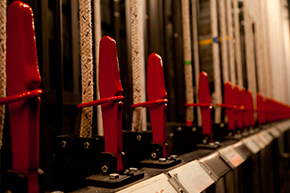BellaTEX Rigging Inspections

“What is involved in a rigging inspection? I can’t even remember the last time our system was inspected.”
This is a question we answer quite a bit. We all know that safety is the utmost concern in any performance space. Even so, stay in this industry long enough and you will have your own horror stories to tell about bad stage rigging you have seen. While this is great for conversation with other techies, bad rigging can prove disastrous in the worst case scenarios we all dread. It is really important to have rigging inspections done periodically, especially if it has been a long time since the last inspection. Keeping things up-to-date can save a great deal of expense down the road. Much like house or car maintenance, it sure is easier and less expensive to fix the little problems as they come up than it is to fix everything all at once.
BellaTEX offers two different levels of rigging inspections. The first level is a preliminary inspection and is most useful when we know the system is old and needs repair, or the system hasn’t been inspected in a long time and the condition is unknown. We visually inspect everything that is accessible and physically test/inspect a random sampling of components, and then we provide a written report. The purpose of our preliminary inspection is to identify any major problems before going to the expense of performing a full inspection. Often, the preliminary inspection shows us that everything looks good and there is no need to proceed with a further inspection. And, sometimes, there is no need to proceed with a full inspection because the preliminary inspection reveals issues which will need to be addressed before proceeding with a full inspection. For example, if our preliminary inspection shows that the wire rope terminations in a system are clearly bad, there is no need to go to the expense of inspecting every inch of wire rope in a full inspection. Proceeding with a full inspection, in this case, would be unnecessary because we would already know the terminations need to be replaced. Another example: if the arbors in a system are KS cast iron, we know they have voids and need to be replaced, so there is no need to check torque on all of the nuts. For this reason, preliminary inspections are usually free, and BellaTEX just bills travel costs.


